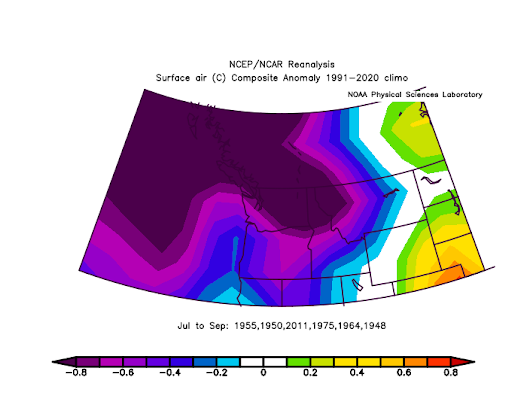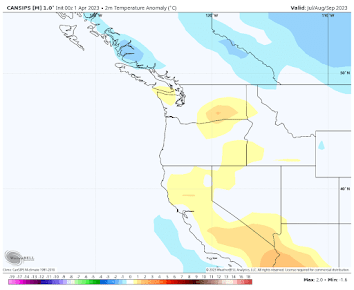I have gotten a lot of questions and comments about the connection between a colder-than-normal spring and conditions during the summer.
Several folks are convinced that a cold spring means a warm summer, mainly based on what happened last year.
So let's look at the data and find out!
Let's start by plotting spring (March-May) temperatures over Washington State using the NOAA Climate Division dataset for the past century (through 2022). Warmer earlier in the period, then cooling in the 1950s-1970s and then warming back to the earlier levels during the past decades.
I then identified the top ten coolest springs.
Next, I determined the top ten coolest springs and plotted their anomaly (different) from normal (the averages for 1991-2020) temperature for the summer (July through September)-- below.
So based on climatology, there is no reason to expect a warmer than normal summer...in fact, just the opposite.
But what about seasonal forecasting models, such as the one run by the European Center? Below is its forecast for the surface air temperature anomaly from normal for July through August. Very close to normal conditions are being predicted.







Hey Cliff, one problem we have this year in forecasting the coming seasons' weather is related to one particular forecast that is already being made - that is, a rapid transition from La Nina this past Winter to El Nino possibly before Summer. If you look back at the ENSO indices (MEI at https://origin.cpc.ncep.noaa.gov/products/analysis_monitoring/ensostuff/ONI_v5.php) values since 1950, there have been only a few times when a transition that rapid occurred during spring - 1965 and 1972. A few other times (2009, 2018) a rapid transition occurred but the El Nino did not start until the summer and the La Nina faded later than it did this year. Of course ENSO is only variable in the equation but given the rarity of this predicted cycle there's not a lot memory built up on the possible effects.
ReplyDeleteThe cfs model should not be ignored but hopefully the European model is correct. I guess will know at the end of the summer which one was right.
ReplyDeleteThe CFS is a ten year old, low resolution, out of date model. Embarrassing for the US
DeleteThe past 2 years a hot summer has followed a cold spring so you can see why people are skeptical. I'm tired of going straight from winter to summer I was really hoping we would have a spring without constant rain and a few sunny average or warmer weekends. Nov thru Feb I expect constant rain but below average gloomy weekend after below average gloomy weekend in April is not normal. Its so disheartening how there have been beautiful sunny Tuesdays and Wensdays but Saturday/Sunday you can count on rain.
ReplyDeleteYes, I agree... by spring I am always wanting for sunshine and when only some days are sunny, well, the problem is, there are five weekdays and just two weekend days so it is easy to miss. Unless of course you are retired (I am not).
DeleteWeather unfortunately doesn't know or care what day of the week it is, I remember back in school in the mid 90s June being gloomy cool and foggy, thinking we're beginning to see that cycle again time will tell
ReplyDelete